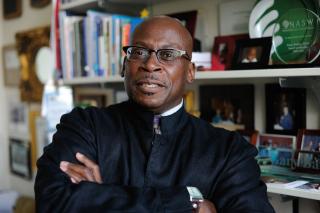This year marks the 34th annual World AIDS Day. This year's theme for World AIDS Day is "Putting Ourselves to the Test: Achieving Equity to End HIV." It encourages people to unite globally to eliminate the disparities and inequities that create barriers to HIV testing, prevention, and access to HIV care.
World AIDS Day is a time to honor and remember those who we have lost to the HIV/AIDS pandemic. It is also an opportunity to let those individuals who are living with HIV/AIDS know that we see them and that we care.
Last year on December 1, we were in the midst of the COVID-19 pandemic and were preparing to deal with its variations. While not as virulent as it was in 2021, COVID continues to be an area of focus and concern. For example, health officials reported 4,497 new COVID-19 cases and 72 new deaths with the new data released Thursday, November 17, 2022.
As I have shared in the past, my introduction to AIDS came in the spring of 1986, I found myself in the intensive care unit at Tufts Medical Center. I was the only person visiting a dear friend who just five days prior had been diagnosed with pneumocystis pneumonia. At the time, this type of pneumonia was known as a difficult to treat opportunistic infection. It was also an indicator that my friend had AIDS. I listened to the respirator that helped him breath, and watched helplessly as his life ebbed away. I had no idea that this was not to be just one heartbreaking loss, but rather the beginning of a period of intense grief that would last for years, as too many of my friends died of the disease.
In those very early days, there was little outreach being done about AIDS in the Black community. In fact, it was hard to find any information at all. But then I met Larry Kessler, who had founded the AIDS Action Committee. I got involved as a volunteer, specifically to get the word out into communities of color that AIDS was something that as a community we needed to address.
In the early days of the AIDS crisis, many of our friends, family, co-workers, and other loved ones were suffering and dying from this devastating disease. Fear and discrimination were prevalent — even in healthcare — and those suffering with HIV/AIDS had limited options.
According to the CDC, approximately 1.2 million people in the U.S. have HIV, and about 13% percent of them don't know it and need testing. HIV continues to have a disproportionate impact on certain populations, particularly racial and ethnic minorities and gay, bisexual, and other men who have sex with men. Black or African American (hereafter referred to as Black) people account for a higher proportion of new HIV infections, compared to other races and ethnicities. In 2019, Black people accounted for 13% of the U.S. population but 40% of people with HIV.
What we learned from the AIDS pandemic, and which has been reinforced by COVID-19, is how much more work we have to do to ensure Equitable Access for people who are marginalized. HIV/AIDS, like COVID-19, laid bare the fact that communities of color were being devastated by the virus at a disproportionate rate and should fuel a national movement to build a fairer health system — something that many of us have been advocating for decades.
HIV disparities can and must end. Racism, longstanding systemic inequities, residential segregation, social and economic marginalization, and other ingrained barriers are among the factors that have contributed to these troubling and persistent disparities. To achieve health equity and end the HIV epidemic, the nation must overcome barriers that have long stood between some people and highly effective HIV prevention and treatment tools.
We cannot afford to think of the AIDS epidemic as some bygone, eradicated condition. It is not.
People who know better, do better. We owe it to those who didn't make it, to do what we can now to end this disease.
As in years past, Simmons is highlighting a community wide World AIDS Day Celebration, "Out of the Ashes" at the Boston Center for the Arts. The 31st annual Day Without Art installation for World AIDS Day offers, according to the website, "a place where people gather to reflect and remember those lost to the AIDS pandemic. This mission remains just as urgent today as we face multiple pandemics of COVID-19, racism, and addiction, alongside the continuing scourge of HIV/AIDS, particularly among vulnerable populations."

